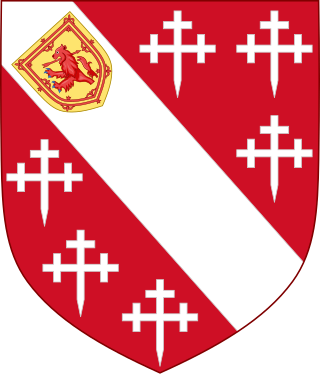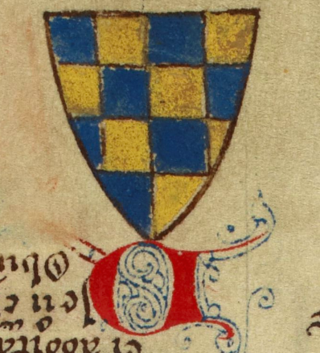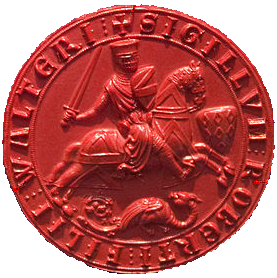Related Research Articles

Magna Carta Libertatum, commonly called Magna Carta or sometimes Magna Charta, is a royal charter of rights agreed to by King John of England at Runnymede, near Windsor, on 15 June 1215. First drafted by the Archbishop of Canterbury, Cardinal Stephen Langton, to make peace between the unpopular king and a group of rebel barons, it promised the protection of church rights, protection for the barons from illegal imprisonment, access to swift and impartial justice, and limitations on feudal payments to the Crown, to be implemented through a council of 25 barons. As neither side stood by their commitments, the charter was annulled by Pope Innocent III, leading to the First Barons' War.

Duke of Norfolk is a title in the peerage of England, and is the premier non-royal peerage. The seat of the Duke of Norfolk is Arundel Castle in Sussex, although the title refers to the county of Norfolk. The current duke is Edward Fitzalan-Howard, 18th Duke of Norfolk. The dukes have historically been Catholic, a state of affairs known as recusancy in England.
Roger Bigod was a Norman knight who travelled to England in the Norman Conquest. He held great power in East Anglia, and five of his descendants were earls of Norfolk. He was also known as Roger Bigot, appearing as such as a witness to the Charter of Liberties of Henry I of England.
Hugh Bigod, 1st Earl of Norfolk (1095–1177) was the second son of Roger Bigod, sheriff of Norfolk and royal advisor, and Adeliza, daughter of Robert de Todeni.

Roger Bigod was the son of Hugh Bigod, 1st Earl of Norfolk and his first wife, Juliana de Vere. Although his father died in 1176 or 1177, Roger did not succeed to the earldom of Norfolk until 1189 for his claim had been disputed by his stepmother for her sons by Earl Hugh in the reign of Henry II. King Richard I confirmed him in his earldom and other honours, and also sent him as an ambassador to France in the same year. Roger inherited his father's office as royal steward. He took part in the negotiations for the release of Richard from prison, and after the king's return to England became a justiciar.

Henry de Bohun, 1st Earl of Hereford of Pleshey Castle in Essex, was an Anglo-Norman nobleman who became Hereditary Constable of England from 1199.

Gilbert de Clare, 4th Earl of Hertford, 5th Earl of Gloucester, 1st Lord of Glamorgan, 7th Lord of Clare was the son of Richard de Clare, 3rd Earl of Hertford (c. 1153–1217), from whom he inherited the Clare estates. He also inherited from his mother, Amice Fitz William, the estates of Gloucester and the honour of St. Hilary, and from Rohese, an ancestor, the moiety of the Giffard estates. In June 1202, he was entrusted with the lands of Harfleur and Montrevillers.

The Howard family is an English noble family founded by John Howard, who was created Duke of Norfolk by King Richard III of England in 1483. However, John was also the eldest grandson of the 1st Duke of the first creation. The Howards have been part of the peerage since the 15th century and remain both the Premier Dukes and Earls of the Realm in the Peerage of England, acting as Earl Marshal of England. After the English Reformation, many Howards remained steadfast in their Catholic faith as the most high-profile recusant family; two members, Philip Howard, 13th Earl of Arundel, and William Howard, 1st Viscount Stafford, are regarded as martyrs: a saint and a blessed respectively.

William de Warenne, 5th Earl of Surrey was the son of Hamelin de Warenne and Isabel, daughter of William de Warenne, 3rd Earl of Surrey. His father Hamelin granted him the manor of Appleby, North Lincolnshire.
Hugh Bigod was Justiciar of England from 1258 to 1260. He was a younger son of Hugh Bigod, 3rd Earl of Norfolk.
Richard de Clare, 3rd Earl of Hertford, feudal baron of Clare in Suffolk, and lord of Tonbridge in Kent and of Cardigan in Wales, was a powerful Anglo-Norman nobleman with vast landholdings in England and Wales.

The House of Mowbray was an Anglo-Norman noble house, derived from Montbray in Normandy and founded by Roger de Mowbray, son of Nigel d'Aubigny.
Robert Fitz Richard (1064–1136) was an Anglo-Norman feudal baron of Little Dunmow, Essex and constable of Baynard's Castle in the City of London. His feudal barony, the caput of which was at Little Dunmow in Essex, was granted to him by the king after it had been forfeited in 1110 by William Baynard, whose grandfather Ralph Baynard was the first holder and the builder of Baynard's Castle in the City of London.

Robert Fitzwalter was one of the leaders of the baronial opposition against King John, and one of the twenty-five sureties of Magna Carta. He was feudal baron of Little Dunmow, Essex and constable of Baynard's Castle, in London, to which was annexed the hereditary office of castellan and chief knight banneret of the City of London. Part of the official aristocracy created by Henry I and Henry II, he served John in the wars in Normandy, in which he was taken prisoner by King Philip II of France and forced to pay a heavy ransom.
William d'Aubigny, was an itinerant justice under King Henry I of England. He was commonly known by the appellation Brito.

William d'Aubigny or D'Aubeney or d'Albini, Lord of Belvoir was a prominent member of the baronial rebellions against King John of England. He was one of the signatories of Magna Carta.

Eustace de Vesci (1169–1216) was an English lord of Alnwick Castle, and a Magna Carta surety. He also held lands in Sprouston, Roxburghshire, Scotland as brother in-law to King Alexander II of Scotland. Eustace was a leader during the Barons' War in 1215 and was killed while undertaking a siege of Barnard Castle in 1216.

John FitzRobert is listed as one of the Surety Barons for Magna Carta (1215), although it seems not previously noted as a rebel. He was the son of Robert fitzRoger and Margaret Chesney.

William FitzGeoffrey de Mandeville was the third Earl of Essex of the second creation from either 1219 or 1216 until his death. He was the second son of Geoffrey Fitz Peter and Beatrice de Say and he succeeded his elder brother Geoffrey FitzGeoffrey as earl and inheritor of the Mandeville earldom and barony. His brother had been a Magna Charta Surety and he was also an ardent supporter of the baronial cause. During the barons war he laid siege to Berkhamsted castle in the month of December 1216, attempting to take it from the castellan Waleran the German. Waleran sallied out when de Mandeville was setting up camp and was able to capture a large amount of de Mandeville's Baggage.and Standard (flag). Later, upon the arrival of Louis VIII of France, the castle was captured on 20 December 1216. He must have reconciled with the royal government of Henry III because by 1220 he complained to the royal administration that his market rights in the town of Moretonhampstead were being infringed upon by Hugh de Chaggeford who was the lord of Chagford which held its own market. In the following court case William's lawyer argued Hugh's market was not a real market but simply a wake where bread and ale were sold but Hugh claimed that his market had been in existence and involved the collection of toll and stallage for one hundred years. The outcome of the case is unknown but there isn't any indication that de Chagford's event was disbanded. He was married to Christina, one of Robert FitzWalter's daughters, but died on 8 January 1227, without heirs and the earldom became extinct.
John Throckmorton, Gent. (1601–1684) was an early settler of Providence Plantation in what became the Colony of Rhode Island and Providence Plantations, and he was one of the 12 original proprietors of that settlement. He emigrated from Norfolk, England to settle in Salem in the Massachusetts Bay Colony, but religious tensions brought about his removal to Providence.
References
- BOMC Home Page
- The Hereditary Society Community of the United States of America
- Stinson, David V., ed., Magna Charta in America. Baltimore: Gateway Press, Inc., 1993 (a project of the BOMC and the Magna Charta Research Foundation)